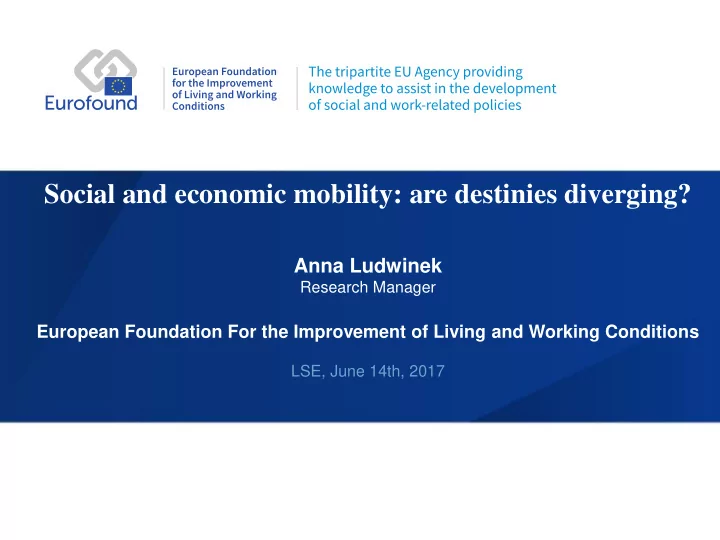

Social and economic mobility: are destinies diverging? Anna Ludwinek Research Manager European Foundation For the Improvement of Living and Working Conditions LSE, June 14th, 2017
Why does social mobility matter? Economic – loss of human capital/skills, growth, inequalities Social – erosion and divergence of solidarity support for public institutions, cohesion Political – democracies work based on the consent of the governed, trust in institutions Moral – social justice/fairness Importance of perceptions (of lack of opportunities, lack of fairness) 2
Social mobility engrained in American and European setting Social foundations - ‘agreed The American Dream - Barack knows the American upon the necessity to promote Dream because he's lived it, improvement of living and and he wants everyone in working conditions of labour this country to have that so as to permit equalization of same opportunity, no matter such conditions in an upward who we are or where we're direction ’ Treaty of Rome from or what we look like or 1957 who we love - Michelle Obama 3
Absolute or Relative social mobility? Absolute: Each generation in relation to generation before (% better off than parents at same age, overall rising of living standards) Relative: (chances of moving up or down) - Individual rank compared the rank of that individuals’ parents at same age Important difference also for policymaking 4
Absolute mobility • Society experienced large shifts in its structure between generations, the extent of upward mobility increased and prevailed over downward mobility. • As the society structure changed (or modernised due to the disappearance of low-skilled menial jobs and growth in service- John F. Kennedy class and highly qualified jobs), the more the extent of absolute social mobility among men and women became similar.
Importance of relative mobility - convergence • …calls for restoring the European “ convergence machine ” thought completing the Economic and Monetary Union and developing a social dimension of the European Union. European Union White Paper 2017 • “A Social Europe: a Union which, based on sustainable growth, promotes economic and social progress as well as cohesion and convergence ”. Rome Declaration, March 25h, 2017 • EC Reflection Paper on Social dimension of Europe – 2017 - stating that ‘ In a modern and cohesive society, everyone should be able to contribute fully and have access to new ‘ladders of opportunities at different stages of their life’
Relative social mobility – Has convergence happened? 1.40 1.20 1.00 0.80 0.60 0.40 0.20 0.00 < 1946 1946 -1964 1964 -1980s AT BE BG CZ DE DK EE ES FI FR GR HU IE NL PL SE SI SK UK 7
Country patterns Stabilizing fluidity 1.5 Invariable fluidity 1.4 1.5 1.3 1.4 1.2 1.3 1.1 1.2 1 1.1 0.9 1 0.8 0.9 0.7 0.8 0.7 0.6 0.6 0.5 0.5 < 1946 1946 -1964 1965 -1975 < 1946 1946 -1964 1965 -1975 CZ DE ES PL Decreasing fluidity HU IE UK Increasing fluidity 1.5 1.4 1.5 1.4 1.3 1.3 1.2 1.2 1.1 1.1 1 1 0.9 0.9 0.8 0.8 0.7 0.7 0.6 0.5 0.6 < 1946 1946 -1964 1965 -1975 0.5 BE DK FI < 1946 1946 -1964 1965 -1975 GR NL SK AT BG EE FR SE 8
Gender matters UK • Men from Generation X 1.00 experience decrease in 0.95 social mobility – UK, 0.90 0.85 France, Sweden, 0.80 0.75 Austria, Estonia and 0.70 Bulgaria. 0.65 0.60 • Increased in Germany, 0.55 Spain but also in 0.50 < 1946 1946 -1964 1965 -1975 countries with higher UK men UK women UK levels of social mobility
Drivers of policy discourse – factors 1. Term (social mobility) rarely mentioned however widespread concern about the impact of inequalities on future generation voiced in most countries 2. Fairness – security of pensions (IT), future of youth (GR, BG) 3. squeezed middle class - diminished role (HU, SI, NL, MT, LV) – growing number of ‘losers’ – impact on the engagement 4. Concerns over social cohesion – increasing regional and residential segregation (Nordic and CEE countries), implication on access to services – place matters 5. Diminishing role of education as a main tool to foster social mobility – value of qualification, maintaining competitive edge 10
Other factors – family, wealth • Family • Parenting skills • Social capital • Cognitive skills/educational attainment • Soft, social skills/access to social networks • Home environment – Sticky top • Wealth concertation
Importance of resilience Source: 4 th EQLS, Q7f and Q7g 12
90% I find it difficult to 80% deal with important problems that 70% come up in my life 60% 50% When things go wrong in my life, 40% it generally takes me a long time to 30% get back to normal 20% 10% life satisfaction 0% Czech… Netherlands Denmark Sweden Finland Austria Slovakia Portugal Germany Poland Luxembourg Croatia Spain UK Ireland Belgium Estonia Malta Slovenia Hungary Italy Latvia Lithuania France Cyprus Romania Greece Bulgaria 4 th EQLS (2016) – preliminary data 13
Future work • Wealth and intergenerational transmission of disadvantage across European countries • Fairness and the future (role of perceptions) Thank you alu@eurofound.europa.eu 14
Recommend
More recommend